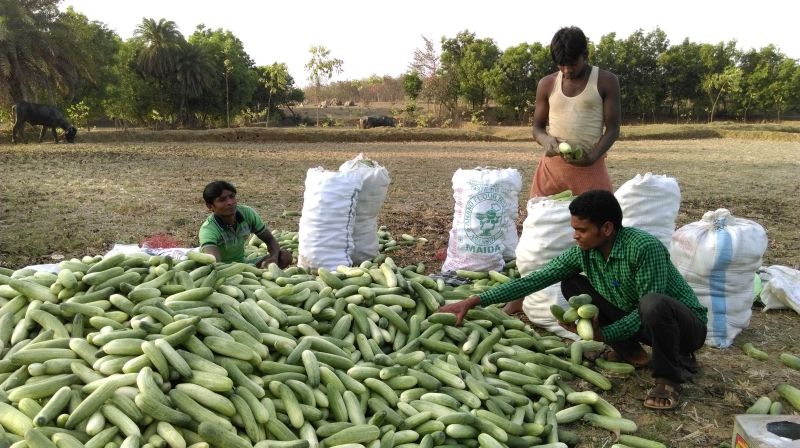For more than a decade, Rampada Mahato as a young boy from a small village in Purulia district of West Bengal had been watching his elders practising organic farming in their farmlands. It was his father who introduced chemical fertilizers and pesticides for the first time in the village with the expectation of getting enhanced crop production. As hoped by his father, the result was good for the first year after the usage of chemical fertilizer and pesticide. The output jumped almost 25-30 per cent compared to the previous year’s output.
Introducing chemical fertilizers and pesticides along with other agricultural inputs cost an investment of Rs 4-5 lakhs in 5 acres of land. Mostly vegetables were grown like Tomato, Cucumber, Brinjal, Bottle Gourd, Pumpkin and Chilli. The output after selling in the market fetched Rs. 6-6.5 lakhs, and the Mahato’s at most received a profit of Rs. 1.3 lakhs annually.
Encouraged by the growth in yield, Mahato’s father continued with the usage of chemical fertilizers and pesticides. To his utter surprise, the production dropped, the production capacity of the soil and the quality of produce went drastically down. The size of crops shrank and its natural flavour was all but lost. The shape and the colour of the crop were nowhere to be found. The output from the farmland could not manage to fetch desired returns from the market.
The same year another incident took place in the village, which transformed the agricultural practice of the young boy and his household. The incident took lives of two children of the village. As reported in the media and shared by the Block Health Centre, the doctor’s diagnosis affirmed excessive presence of chemical components in the daily food intake, mostly through vegetables.
Rampada Mahato took a vow not to use any chemical fertilizers and pesticides in his farmland. Instead, he began preaching the benefits of practising organic farming to his fellow farmers and villagers. Every Sunday he gives training to other farmers in the village on various organic farming practices learnt from Green College initiative, which involves Bio-inputs.
In Mahato’s village, rainfed agriculture is prevalent, and generally traditional agriculture practices are carried out in the area. To facilitate sustainable livelihood in the agriculture and allied sector, in an area like this, Green College, an initiative by Society for Promotion of Wastelands Development (SPWD) and Welthungerhilfe provides a base for skill development to semi and unskilled youths. “Green College acts as a catalyst to establish a sustainable institutional model through which skills can be transferred to youths”, says Sanjay Gorai, Principal, Green College-SPWD.
Mahato after his training at Green College-SPWD, Ranchi turned out to be expert of sorts in Bio-inputs. Previously, the organic farming practices followed in Mahato’s farmland were traditionally backward and not systematic, which resulted in less output even though the produce was healthy. Application of cow dung and urine with lime powder (Calcium Hydroxide) in the farmland was followed with traditional practice of farming. After receiving training on Bio-inputs under the project of Green College in August, 2015, Rampada changed his age-old traditional agricultural practice and started investing the knowledge gained from training on Bio-inputs in his farmland.

Mahato used his expertise in 3 acres of land for producing cucumber with an investment of around Rs. 45000, including tractor and fuel charges. In return, he got a production of Rs. 80000 from 75 per cent of land and still awaits produce from the remaining 25 per cent of land as collection of the entire cucumber produce is yet to be through. It is estimated that the produce can fetch a profit of Rs. 40000 for a single crop of cucumber. This clearly shows that the cost economics turns out to be favourable for farmlands using Bio-inputs. Not just that, Mahato’s case indicates that farming this way will support the agro-ecosystem to cope with the changing climate by adopting better management practices.
“Green College acts as a service provider, to integrate small farmers like Mahato to shift to better farm practices, which are missing in their traditional skill set”, adds Sharat Singh, Programme Director, SPWD. Through the training provided by SPWD’s Green College, it is hoped that youth will get gainful employment in the agriculture and allied sector.
Abhishek Toppo, Course Coordinator-Green College, SPWD

Thanks
LikeLiked by 1 person
Good Achievement and Case . Congratulations.
LikeLike
[…] Source: Soil fertility gets a fillip through the efforts of an organic crusader – SPWD India […]
LikeLike
Dear Mr. Toppo
I really like the article and strongly feels that one day Indian farming practices change into traditional to organic farming, but in order to achieve this proper training and awareness generation camp should organised by the government or non government sectors on continuous basis.
Regards
Your friend
Shipra
LikeLike
Great initiative by Green College.
Chemicals fertilizers and pesticides have been part of agriculture for decades. They have benefits and inconveniences.
Now that we are aware of that, we have to be more careful
about the way we are utilizing them.
And prioritize organic-farming as they cause less damage to the environment and our health.
LikeLike